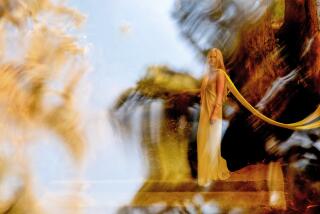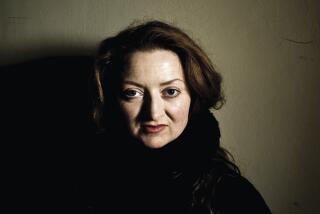Gothic dreams
OFTEN we’re told that truth is stranger than fiction -- so often that the claim begins to seem defensive, a whistling in the dark that distracts us from the unpredictable action of imagination. But the most absorbing and ambitious fiction proves that truth is not stranger than fiction. A powerful novel illuminates, through its imaginative inventions, the strangeness of truth. And a novel as daring as Jennifer Egan’s “The Keep” makes us think hard about one of the murkiest mysteries of all: the mystery of perception, that uncertain border where reality and imagination meet.
Gothic fiction in particular tends to make this mystery central by mixing wild situations with what poet John Berryman called “impassioned realism.” And “The Keep” has all the trappings of the gothic novel: a ruined castle, a tower (the “keep” of the title), tunnels, torture rooms and a creepy baroness. But Egan’s novel also is full of conflicts involving cellphones, satellite dishes, scrambled eggs and jet lag. It’s an inventive combination and irresistibly suspenseful.
Egan’s earlier books are “Look at Me,” “The Invisible Circus” and a collection of stories, “Emerald City.” She has distinguished herself as a writer whose prose is flexible, energetic and always to the point. In “The Keep,” even in those passages communicating a character’s deep ambivalence, she has chosen words that are the simplest and yet the most suggestive. She blends speech and action, eliminating unnecessary fillers and setting off dialogue with colons:
“Howard: I’ve given you the wrong impression. There is something missing.
“Danny: What?”
In this scene, the two men are climbing a broken section of the castle wall. When they manage to reach the top, Danny, the novel’s protagonist, asks Howard, his cousin, about that missing something: “How do you know it exists?”
“Howard turned to him. I feel it. Right here. He socked a fist into his own gut with a force that would’ve made Danny gag. It’s -- I don’t know what. A map. A clue. A key. It might not even be a thing. It could be an idea.”
Howard and Danny have a complicated history, their early years punctuated by a cruel trick played on Howard that resonates throughout the novel. Howard manages to prosper as an adult, buys an old castle in Eastern Europe and invites Danny to help him renovate it. Danny, who has nothing better to do (other than talk on his cellphone and check his e-mail), accepts the offer. But from his first entrance into the castle, everything goes wrong. He keeps stumbling, falling and making a fool of himself. And then he meets the baroness.
This is a subtly complex novel, with multiple narratives that mesh in fascinating ways. Danny wonders, and we wonder with him, whether he’s losing his mind. He’s suspicious about Howard’s motives, and his suspicion develops into a powerful paranoia, “the worm,” which burrows into him and inhabits his mind. He grows increasingly unsure about the nature of his experience. Is he dreaming? Is he insane?
Sharing a bottle of Burgundy from 1898 with the baroness, he begins to feel “weird,” but in a different way from the weird feelings he’s had since arriving at the castle: “Those other weirds were the opposite of calm and fine, but this weird was calm and fine. Danny felt calm and fine, but also like he was asleep. Or at least not awake. His brain was cut off from his body, which had gotten out of its chair and was following the baroness to the door.”
Egan is adept at building scenes that are strong enough in their implications to accommodate long interruptions. Early in the novel, she introduces another central character, a man named Ray, who is seemingly unconnected to Danny and Howard. Ray is in jail, biding his time in whatever activity is permissible -- in this case, a writing workshop. Readers may well resist this turn in the novel, when the prison writing workshop replaces the castle as the setting. I admit that I was skeptical. Yet although this premise lands with a dull thud initially, Egan gives Ray a complex eloquence. He is a reluctant narrator, and his reluctance makes his story funny, spirited and increasingly moving. He is compelled to write because he has fallen in love with Holly, his workshop instructor; at a climactic moment, he succeeds in putting a collection of words to unexpected use, finding in his memory of language a beautifully cumulative understanding of his life:
“Then I lie on the floor because I’m tired and the words are starting to come up and I want to hear them, I want to catch them. I shut my eyes: redneck and juicehead and ... crapshoot and hothead, words floating around me like leaves coming off a tree, like I’m a kid lying on my back in the grass watching them come down: jive and joystick and jalopy and hollow and holy and Merry Christmas and Whose turn is it to put the star on the tree?”
In a novel full of unexpected shifts and interruptions, it’s amazing how deftly Egan builds a logic for her characters. There’s an inevitable quality to the mental associations each character makes, perhaps because so much is artfully connected in the end.
Berryman used the phrase “impassioned realism” to describe Matthew Lewis’ “The Monk,” a late 18th century gothic novel that is notable, according to Berryman, not for its realistic details or its credible “chain of deepening terrors and enchantments” or its imaginative elements. “The Monk” (which ends with the title character being carried away by the devil) is a great book in Berryman’s opinion because its author “contrives with the Strange to deepen interest while maintaining the Natural.”
A similar blend makes “The Keep” suspenseful and absorbing. In places, the novel might be vulnerable to charges of unresolved improbability. But it’s impressive that Egan doesn’t fall back on farce, cartoon or self-conscious parody to deflate the improbable aspects of the fiction. Overall, the improbability of “The Keep” is as bold as its realism is impassioned.
These days, there is more pressure than ever on writers to represent familiar aspects of the culture -- to make the setting of our time and place their subject. But it’s important for fiction to do more than illustrate where we are today, stuck inside our particular categories. A novel like “The Keep” shows us what it’s like to live outside of today’s categories and to exist in unreal situations, in dreams, in confusion, in the experiences of others.
More to Read
Sign up for our Book Club newsletter
Get the latest news, events and more from the Los Angeles Times Book Club, and help us get L.A. reading and talking.
You may occasionally receive promotional content from the Los Angeles Times.








